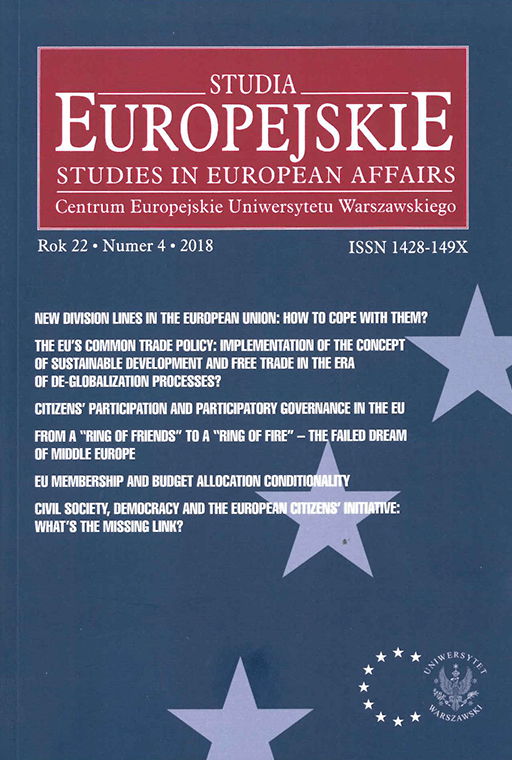
ISSUE: 4/2018
- Volume 22
- Number 4
- 2018
Subscribe NEWSLETTER
Studia Europejskie –
Studies in European Affairs
ISSN: 1428-149X
e-ISSN: 2719-3780
License
Articles published in the journal are under a Creative Commons Attribution – Non Commercial – No Derivatives 4.0 International License
Digitalisation in the Regional Context: The Case of E-Government Services in Latvia
Abstract
This article examines problems related to digital trends in economies and societies from two perspectives: the extension of a digital economy to social dimensions, and the role of digital government services in regional cohesion perspectives in Latvia. This methodological approach could serve as a tool for integrating a number of main goals related to the digitalisation trends in the EU, that require support of societies as well as the improvement of social
welfare at the regional and national levels. The contribution aims to offer insight into the concept of social investment and innovation as well as co-creation concept and the impact of digitalisation of public services on regional cohesion. The study observes these implications in relation to the need to expand and adapt the content and approach of the digital services implementation. The further digital development as a precondition for diminishing regional and wellbeing divide, facilitating administrative processes for people and entrepreneurs, as well as e-services availability in Latvia is discussed.
The article concludes that effi cient decision-making related to social investment and innovation for improving social welfare at regional and national levels needs implementation of digitalised services in a wider scale as they inevitably become more important due to the increased digital competitiveness of countries.
References
Andrews C., Integrating Public Services Motivation and Self-Determination Theory: A Framework, “International Journal of Public Sector Management”, vol. 29(3)/2016.
Briggs L., Citizens, Customers, Clients or Unwilling Clients?, In: Putting Citizens First. Engagement in Policy and Service Delivery for the 21st Century, eds. E.A. Lindquist, S. Vincent, J. Wanna, Australian National University, Canberra 2013.
CITADEL project is being implemented under the “Horizon-2020” programme, Grant agreement No 726755.
Degryse Ch., Digitalisation of the Economy and its Impact on Labour Markets, ETUI, Brussels 2016.
Daglio M., Gerson D., Kitchen H., Building Organisational Capacity for Public Sector Innovation, Background Paper, OECD Conference “Innovating the Public Sector: from Ideas to Impact”, Paris, 12–13 November 2015.
The Digital Economy, OECD DAF/COMP(2012) 22.
Digital Economy and Society Statistics – Households and Individuals, Eurostat, Brussels 2017.
Digital Single Market Strategy for Europe, COM/2015/0192 final, Europe in a Changing World – Inclusive, Innovative and Refl ective Societies,
EC C (2016) 4614 of 25 July 2016.
European Digital Progress Report: Review of Member States’ Progress Towards Digital Priorities, European Commission, Brussels 2017.
Regulation (EU) No 2015/1017 of the European Parliament and the Council of 25 June 2015, European Fund for Strategic Investments, OJ L
169/1, 2015.
European Parliamentary Research Services (EPRS), Briefing, 25 March, Brussels 2014.
Fotaki M., Towards developing new partnerships in public services, ”Public Administration”, vol. 89/2010.
Grootaert Ch., van Bastelaeer T., Understanding and Measuring Social Capital: A Synthesis and Findings from the Social Capital Initiative, Working Paper 24, World Bank, Washington DC 2001.
Hemerijck A., Vandenbroucke F., Social Investment and the Euro Crisis: The Necessity of a Unifying Social Policy Concept, “Intereconomics”, vol.
47(4)/2012.
Hogan A., Young M., Rural and Regional Futures, Routledge, LondonNew York 2015.
Innovation and Research Strategy for Smart Specialisation. The Initial Position of Latvia, Ministry of Education and Science, LR Ministry of
Economy, March 2013.
IMD World Digital Competitiveness Yearbook 2017 Results. International Institute for Management Development, Switzerland 2017.
Jenson J., Redesigning Citizenship Regimes After Neoliberalism: Moving Towards Social Investment, In: Towards a Social Investment State? Ideas, Policies and Challenges, eds. N. Morel, B. Palier, J. Palme, Policy Press, Bristol 2012.
Muravska T., Stacenko S., Zeibote Z., Digital Single Market Conducive to the Promotion of Social Dialogue and Social Investment in the Regional Cohesion Contextin New Challenges of Economic and Business Development– 2017 Digital Economy, University of Latvia, Riga 2017.
Osborne S., Radnor Z., Nasi G., A New Theory for Public Service Management? Toward a Public Service-Dominant Approach, “American Review
of Public Administration”, vol. 43, no. 2, 01.03.2013.
Parrado S., Van Ryzin G., Bovaird T., Lö ffl er E., Correlates of Co-production: Evidence From a Five-Nation Survey of Citizens, “International Public Management Journal”, vol. 16, no. 1/2013.
Petrescu M. et al., Public Management: between the Traditional and New Model, “Review of International Comparative Management”, vol.
11(3)/2010.
Putans R., Nartisa I., Muravska T., Strategic Planning and Management in Public and Private Sector Organizations in Europe, “Comparative Analysis and Opportunities for Improvement. European Integration Studies”, vol. 6/2012.
Public Administration’s Customer Care, in Baltic Business and Socio-Economic Development 2008, eds. T. Muravska, G. Prause, Berliner Wissenschafts Verlag GmbH, Berlin 2009.
Resilient Economies and Inclusive Societies – Empowering People for Jobs and Growth, OECD, Ministerial Council Statement, 2014.
Science, Research and Innovation Performance of the EU. Strengthening the foundations for Europe’s future, European Commission, 2018.
Torfing J., Sørensen E., Røiseland A., Transforming the Public Sector Into an Arena for Co-Creation: Barriers, Drivers, Benefi ts, and Ways Forward, “Administration and Society”, vol. 28/2016.
Understanding the Digital Divide, OECD, 2001.
Valenduc G., Vendramin P., Work in the Digital Economy: Sorting the Old From the New, Brussels 2016.
Verschuere B., Brandsen T., Pestoff V., Co-production as a maturing concept, in: New Public Governance, the Third Sectorand Co-Production, eds. V. Pestoff, T. Brandsen, B. Verschuere, Routledge, New York 2012.
Voorberg W.H., Bekker V., Tummers L., A Systematic Review of Co-Creation and Co-Production: Embarking on the Social Innovation Journey, “Public Management Review”, vol. 17/2015.
Language: English
Pages: 251-266
How to Cite:
Harvard
Muravska, T. and Stacenko, S. and Zeibote, Z. (2018) "Digitalisation in the Regional Context: The Case of E-Government Services in Latvia". Studia Europejskie – Studies in European Affairs, 4/2018, pp. 251-266.